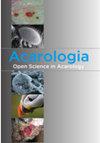墨西哥黑莓(Rubus ulmifolius Schott)上的长尾蝽、长尾蝽和长尾蝽:发生、互补描述和生物学
IF 0.9
3区 农林科学
Q3 ENTOMOLOGY
引用次数: 0
摘要
黑莓(Rubus ulmifolius Scott)是墨西哥重要的经济作物。角蛾螨是世界范围内影响这种作物生产的最重要的节肢动物害虫之一。尽管如此,关于墨西哥黑莓上Eriophyoidea物种多样性的报道很少。我们从最重要的黑莓产区米却肯州的两个城市取样了六个果园。2018年5月至11月期间每月进行抽样。只发现1种类鼻螨,分别为:Diptacus rubuscolum Trinidad、Duarte和Navia。我们对这种螨进行了详细的形态学研究,并提出了补充描述。此外,我们获得了线粒体细胞色素氧化酶亚基I (mt COI)的部分序列,rRNA的18S和28S。在受控条件下(25°C, 60% RH和12:12光照)测定每个发育阶段的持续时间。我们通过比较样本中28S rRNA中D2区域的部分序列和从GenBank中检索到的序列,确认了rubuscolum的身份。总体而言,形态特征与模式标本基本一致。但指出了它们在体型和ememstructure上的一些差异。红柱瓢虫的发育阶段为卵、幼虫、蛹、蛹、象蛹和成虫,平均持续时间分别为75(±10)、56(±9)、21(±7)、41(±8)、19(±6)和114(±12)h。所产生的信息提供了有关该物种在墨西哥黑莓上的发生以及原始生物学方面的见解和知识。本文章由计算机程序翻译,如有差异,请以英文原文为准。
Diptacus rubuscolum Trinidad, Duarte and Navia (Eriophyoidea: Diptilomiopidae) on blackberry (Rubus ulmifolius Schott) in Mexico: occurrence, complementary description, and biology
Blackberry (Rubus ulmifolius Scott) is an economically important crop in Mexico. Eriophyoidea mites are among the most important arthropod pests affecting production of this crop worldwide. Despite this, reports on species diversity of Eriophyoidea on blackberry in Mexico are scarce. We sampled six orchards from two municipalities in the state of Michoacan, the most important region for blackberry production. Sampling was carried out monthly between May and November 2018. Only one species of eriophyoid mite was found, Diptacus rubuscolum Trinidad, Duarte and Navia. We conducted a detailed morphological study of this mite and a complementary description is presented. In addition, we obtained partial sequences of the mitochondrial cytochrome oxidase subunit I (mt COI), the 18S and 28S of the rRNA. The duration of each developmental stage was determined under controlled conditions (25 °C, 60% RH and 12:12 light regime). We confirmed the identity of D. rubuscolum by comparing partial sequences of the D2 region within the 28S rRNA from our samples and sequences retrieved from GenBank. Overall, morphological characteristics were in line with the type specimens. However, some differences on body shape and empodium structure were pointed out. The developmental stages of D. rubuscolum were egg, larva, nymphochrysalis, nymph, imagochrysalis and adult, with a mean duration of 75 (±10), 56 (±9), 21 (±7), 41 (±8), 19 (±6) and 114 (±12) hours respectively. The information produced provides insight and knowledge on the occurrence of this species on blackberry in Mexico as well as on original biological aspects.
求助全文
通过发布文献求助,成功后即可免费获取论文全文。
去求助
来源期刊

Acarologia
ENTOMOLOGY-
CiteScore
2.00
自引率
18.20%
发文量
81
期刊介绍:
Acarologia is a free open-access journal. Please help us by submitting manuscripts in accordance with following instructions.
All manuscripts which do not conform to the instructions will be returned to authors without the benefit of review.
Acarologia publishes the results of original research on all aspects of Acarology.
The journal policy is that taxonomic descriptions should include several species within a same genus/family, when possible.
The editors reserve the right to refuse manuscripts when authors intentionally divide individual species descriptions of the same genus/family into distinct publications.
Single species descriptions should be clearly justified based on their scientific interest.
 求助内容:
求助内容: 应助结果提醒方式:
应助结果提醒方式:


